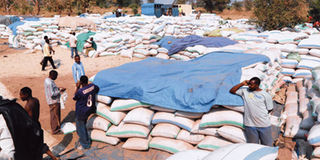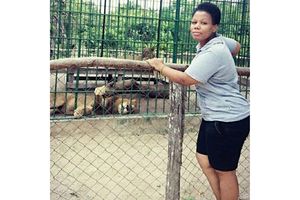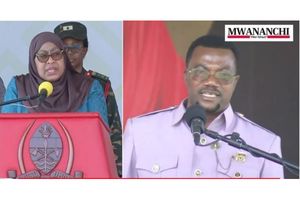LOCAL FEATURE: Rukwa prepares to make case for increased local investment

Rukwa Region is known as one of the country’s breadbaskets for its bumper harvests of maize. Investments in agro-processing are likely to add value to harvested maize and encourage growth of the agro-sector in the region. PHOTO| MUSSA MWANGOKA
What you need to know:
- As Mtwara and Lindi regions are opening up following discoveries of oil and gas, Rukwa is endowed with mineral resources such as iron, silver, coal, lead, limestone, mica and gemstone
Sumbawanga. Rukwa Region, located in south-western Tanzania 1,200 kilometres from the commercial capital Dar es Salaam, will throughout this week be in local and international headlines as it showcases its investment opportunities which are in abundance.
Dubbed one of the handful backward regions, a group that includes Lindi, Mtwara, Kigoma, Ruvuma and Coast, Rukwa, with a population of 1,004,539 people has the potential to pull itself out of this economic quagmire if it would be able to convince the multitude of local and international investors attending the investment forum that started in Sumbawanga yesterday.
As Mtwara and Lindi regions are opening up following discoveries of oil and gas, Rukwa is endowed with mineral resources such as iron, silver, coal, lead, limestone, mica and gemstone most of which are not yet exploited while prospecting of petroleum and gas is going on in Lake Tanganyika and Lake Rukwa.
“Rukwa Region is now ready for investments,” beams Mr Chrisant Mzindakaya, a retired civil servant and politician, who is now probably the region’s leading investor owning a cattle ranch and a state-of-the-art meat processing plant in the east African region.
Mr Mzindakaya says the investment forum which started yesterday through November 1, this year, when President Jakaya Kikwete will speak to the investors in Sumbawanga, the region’s capital, will provide a platform to prospective investors to understand investment potentialities in the region.
“Rukwa Region is teaming up with other Lake Tanganyika zone regions of Katavi and Kigoma in showcasing their investment potentials in tourism, agriculture, fisheries and livestock keeping,” says the retired politician who served as a Member of Parliament for 44 years and as regional commissioner for Mbeya, Morogoro, Kigoma and Rukwa for 13 years.
Mr Mzindakaya pays fulsome tribute to Rukwa regional commissioner, Eng. Stella Martin Manyanya and her counterparts in Katavi and Kigoma for working tirelessly in organising the investment forum which will open new economic and development chapters for the three peripheral regions.
“Their commitment towards the economic development of the Lake Tanganyika zone is undoubtedly encouraging, and they have the full support of wananchi,” says Mr Mzindakaya who also owns a decent Kalambo Falls Gorge Hotel in Sumbawanga.
He says poor road infrastructure in the region has significantly slowed down development but this will soon be history following the government’s move to construct to tarmac level the 240-kilometre Tunduma-Sumbawanga road, another 240-kilometre Sumbawanga-Mpanda road and Sumbawanga-Kasanga road connecting to Lake Tanganyika.
“The construction of the Tunduma-Sumbawanga road has been completed by 90 per cent and the Sumbawanga-Mpanda road has reached 50 per cent. Rukwa Region will soon be connected throughout the country,” he says.
Eng. Manyanya, who has been busy throughout the month making sure that the investment forum becomes a success, says upon completion of the construction of the roads Rukwa will be linked with cities and towns throughout the country.
“The region will also be connected to central and southern African countries such as the Democratic Republic of Congo, Burundi, Rwanda, Zambia and other SADC countries,” she says in an interview with The Citizen.
As for power supply, Eng. Manyanya says that the region is not connected to the national electricity grid system, but it is connected to the Zambia Electricity Supply Company (ZESCO) following an agreement made between the Ministry of Energy and Minerals and the Zambian power company.
“To complement that source of power, the government has recently installed generators in Sumbawanga as an additional source of power,” says the electrical engineer.
This power supply meanwhile serves Sumbawanga and Namanyere towns as well as some villages along the power line to Namanyere in Nkasi District, she says.
“There are a good number of modern communications and media companies operating in the region, serving both local and international needs,” she adds.
Ecologically, she says, Rukwa Region with districts of Sumbawanga, Nkasi and Kalambo consists of three agro-ecological zones of the Ufipa plateau, the Rukwa valley and the Lake Tanganyika shores which are favourable for development of agriculture, forestry, industry and tourist services.
The economic growth rate in terms of GDP at current market price in 2010, 2011 and 2012 was Sh1,092,300, Sh1,293,386 and Sh1,529,289 respectively while per capital income for 2010, 2011 and 2012 was Sh726,658, Sh830,052 and Sh974,601, respectively.
Mr Sadrick Malila, Rukwa region’s chairman of the Tanzania Chamber of Commerce, Industry and Agriculture (TCCIA), says members of his chamber were looking forward to getting joint ventures in agro-processing that will add value to crops.
“We are also looking forward to getting investors in large scale farming for paddy, beans and maize,” says Malila.
Dr Rajabu Rutengwe, Katavi regional commissioner, says the investment forum in Rukwa Region has been preceded with two other such forums held in Katavi Region in 2011 and 2012 which have begun paying dividends.
“We have started getting investment commitments in tourism, minerals, agriculture and infrastructure,” says Dr Rutengwe, adding that regional commissioners for Katavi, Rukwa and Kigoma had agreed to organise such forums as the best way of attracting investors to the Lake Tanganyika zone regions.
Dr Rutengwe says the theme of the Rukwa investment forum will be on small and medium enterprises (SMEs) focusing on value addition to agricultural produce.Rukwa Region came into being in 1974 when part of Mbeya and Tabora regions were demarcated to form the new region.
The region borders with Zambia to the southwest, the Democratic Republic of Congo (DRC) to the west across Lake Tanganyika, Katavi Region in the north and Mbeya to the southeast.
The highest point of the region is at Malonje in the Ufipa plateau at 2,461 metres above sea level and the lowest point is Lake Tanganyika at 773 metres above sea level.




